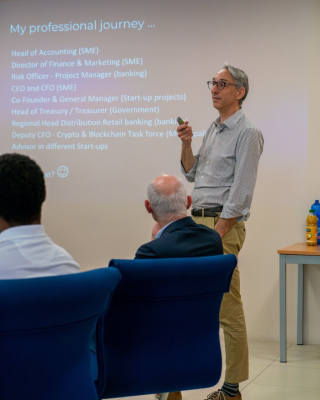
The Business and Economics Division, represented by Professor David Suleiman, was honored to welcome Paolo Bortolin, Deputy CFO and Member of the City of Lugano's Crypto and Blockchain Taskforce to Franklin University Switzerland. In his presentation to Franklin students, Bortolin elaborated on his experience issuing the first digital bond for the city of Lugano. A digital bond is a debt issued by companies, municipalities, states, and sovereign governments using blockchain technology to finance projects. For investors, it's a fixed-income investment processed through blockchain technology, which offers a quicker and more secure process for both investors and bond issuers and opens the door to allow for a broader investor base. Lugano was one of the first cities in the world to issue such a bond and Paolo Bortolin played an integral part in executing the issuance of these digital bonds. Bortolin also described in his presentation the challenges he faced during the issuance of the bonds including the persuasion of the Lugano City Council, the negotiations with Moody's regarding bond rating, assessing the investor's interest, creating a fair and even spread, and determining the timing of the bond's issuance.
The students at Franklin University Switzerland were not just passive listeners, but actively engaged with the topic of digital bonds, posing insightful questions about its nuances compared to traditional bonds. Bortolin, appreciating their enthusiasm, shared that the initial goal of the first digital bond was approval. However, with the bond being issued in a shorter time, at a lower cost, and with less labor, their new aim is to reduce commission costs and issue more digital bonds to support the development of the City of Lugano.
Bortolin expects digital bonds to become increasingly used over the next few years. Although technology is ever-increasing, there is still resistance to the blockchain. In particular, Bortolin experienced some resistance from the financial sector in incorporating digital bonds. However, since the start of his journey in 2022, there have been signs of growth. Initially, there were three banks interested in the underwriting of the digital bond, and now there are nine to ten. According to Bortolin, these are signs that the applicability of digital bonds will be more prominent in the coming years.
To end the presentation, Bortolin asked the question below, sparking what felt like a never-ending and intriguing conversation and debate:
"Do we need intermediaries to issue and trade bonds?"
Written by Denzel Louis




